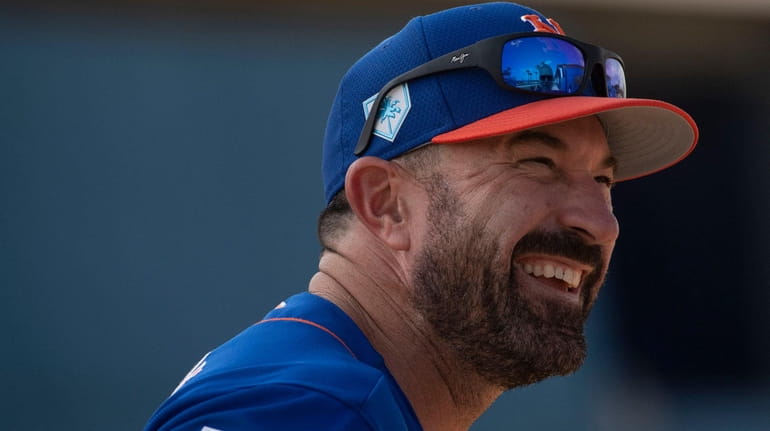Mets are mostly OK with 20-second pitch clock

Mets manager Mickey Callaway smiles during a spring training workout on Tuesday in Port St. Lucie, Fla. Credit: Newsday/Alejandra Villa Loarca
PORT ST. LUCIE, Fla. — A pitch clock is coming to the major leagues, at least on a trial basis during spring training, and the Mets seem mostly fine with that.
Commissioner Rob Manfred said during the weekend that baseball will implement a pitch-clock system during exhibition games, which for the Mets begin Saturday against the Braves, with an eye on using it in the regular season, too. Major League Baseball plans to announce details of the spring training pitch clock by next week.
The minor leagues have used a 20-second pitch clock since 2015. MLB has flirted with the idea for years, and now it’s close to reality.
“It is what it is,” said Mets pitching coach Dave Eiland, who is generally unafraid to share an opinion when he has one. “Twenty seconds is a lot of time.”
The idea is to shave minutes off game times — shorter games are more palatable for the casual fan, the thinking goes — and is part of baseball’s ongoing pace-of-play efforts. Manfred is allowed to unilaterally add pitch clocks for the regular season, but the league and the MLB Players Association are negotiating several pace-of-play initiatives, pitch clock included.
“We will start getting ready for the possibility that we will use the pitch clock [starting] Opening Day, kind of phase in to get everybody, umpires and players used to it, but we’re still hopeful that we’re going to make an agreement,” Manfred told reporters Sunday in West Palm Beach. “It will be a soft phase in [so] get used to what it feels like.”
Some Mets will need to make a bigger adjustment than others. Jeurys Familia, for example, took 30.3 seconds between pitches last season, according to FanGraphs. That ranked tied for fourth slowest among the 336 pitchers who threw at least 50 innings.
Steven Matz was second fastest at 19.5 seconds between pitches.
“I thought we had pitch clocks,” Matz said.
Edwin Diaz (20.8 seconds), Zack Wheeler (21.3) and Jacob deGrom (21.9) were also on the fast end of the scale. Noah Syndergaard, at 24.2 seconds, was middling, but said he doesn’t expect to have to make an adjustment. He was still in Triple-A when the minors’ pitch clock debuted and doesn’t remember it being an issue.
Similarly, Eiland, who said he has addressed the clocks with his pitchers, conferred with Glenn Abbott, the pitching coach for Triple-A Syracuse, who said it was never a problem.
“Our guys work fast anyway,” manager Mickey Callaway said. “I don't think it's even going to be an issue. That’s something that Dave preaches. I know I value it. Get on the mound and throw the ball.
“We're going to play by the rules, whatever they implement. I know Major League Baseball is doing whatever they can to make the game better. Whatever they implement, we're going to abide by it and make it happen.”
There is skepticism from some, though, that pitch clocks will have the desired effect of keeping games moving and making them shorter. And reliever Justin Wilson (26.2 seconds) pointed out that it’s not always the pitcher’s fault when a game is crawling along.
“I don’t know how much it’s going to speed things up,” Wilson said. “When does the clock actually start? If I’m up on the mound and the hitter has dirt in his eye — what really goes into it?
“I’ll work at my speed. It goes both ways. Sometimes the hitter is not ready. Sometimes the umpire is not ready.”
Consider Syndergaard a fan of pace-of-play initiatives generally, including an under-consideration rule that would place a three-batter minimum on pitchers (in an effort to limit pitching changes).
“I’m all for that,” Syndergaard said. “It was really annoying last year with [pitchers] coming in for one batter. That was just driving me insane in the dugout. I can’t imagine what it’s like for the fan experience. I can definitely vouch for quicker games.”
The quickest and slowest workers in the majors last season (minimum 50 innings):
Fastest 5
Pitcher, 2018 team Time between pitches in seconds
1. Brent Suter, Brewers 18.6
2. Steven Matz, Mets 19.5
3. Wade Miley, Brewers 19.8
4. Doug Fister, Rangers 20.1
5. James Paxton, Mariners 20.1
Slowest 5
1. Bud Norris, Cardinals 31.2
2. Brad Hand, Padres/Indians 30.5
3. Joe Kelly, Red Sox 30.5
4. Pedro Baez, Dodgers 30.3
5. Jeurys Familia, Mets/A's 30.3
Where the Mets' starting rotation ranked in pace of play:
2. Steven Matz 19.5
22. Zack Wheeler 21.3
42. Jacob deGrom 21.9
52. Jason Vargas 22.2
184. Noah Syndergaard 24.2.
